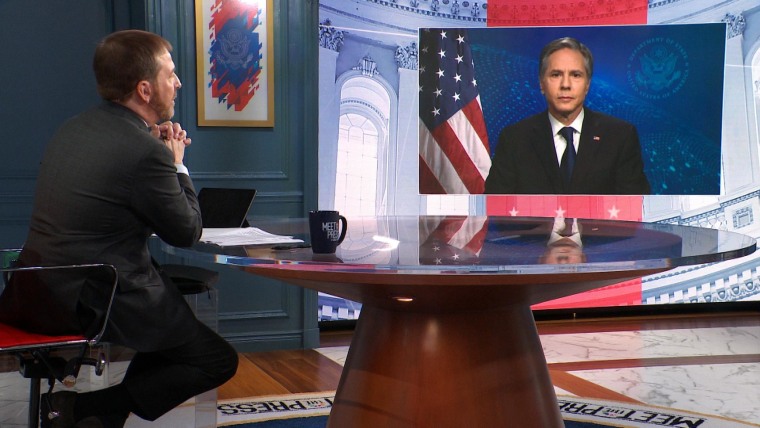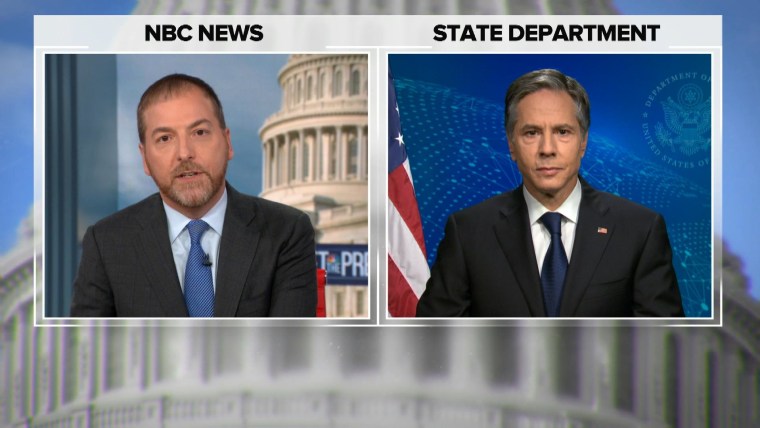WASHINGTON — Secretary of State Antony Blinken criticized China's handling of the Covid-19 pandemic in an interview Sunday on NBC's "Meet the Press," arguing that its "failure" to cooperate in the early stages of the virus led to the situation's getting "out of hand."
"I think China knows that in the early stages of Covid, it didn't do what it needed to do, which was to, in real time, give access to international experts, in real time to share information, in real time to provide real transparency," he said.
"One result of that failure," he said, is that the coronavirus "got out of hand faster and with, I think, much more egregious results than it might otherwise."
Blinken said the pandemic has underscored the need for a global approach, with a "stronger global health security system" to prevent future pandemics or mitigate them.
"That means making a real commitment to transparency — to information-sharing, to access for experts. It means strengthening the World Health Organization and reforming it so it can do that. And China has to play a part in that," he said.
The initial Covid-19 cases have been linked to a seafood market in Wuhan, China, but scientists still don't fully understand the origins of the virus. The World Health Organization said in a report last month that the virus probably started in bats and that it is "extremely unlikely" that the virus came from a laboratory leak.
The Trump administration harshly criticized China's response to the pandemic, and Blinken's argument for a global effort contrasts with the previous administration's approach. Often calling the virus the "China virus," former President Donald Trump moved to withdraw from the World Health Organization in the middle of last year, arguing that it was too "China-centric." The Biden administration reversed the move before it could take effect.
Blinken said that as the U.S. and other developed countries ramp up their Covid-19 vaccinations, the U.S. has a "significant responsibility" and will be a "world leader on helping make sure that the entire world gets vaccinated."
"Unless and until the vast majority of people in the world are vaccinated, it's still going to be a problem for us. Because as long as the virus is replicating somewhere, it could be mutating, and then it could be coming back to hit us," he said.

Blinken's comments about China didn't end at the virus. He also warned it in regard to Taiwan, which has long been pressured by its Chinese neighbor. Asked about the U.S. posture on tensions there, Blinken said it would "be a serious mistake for anyone to try to change the existing status quo by force" and added that "we have a serious commitment to Taiwan being able to defend itself."
He addressed questions about boycotting the 2022 Winter Olympics in China over human rights concerns, saying that the U.S. wasn't "there yet" and that the discussion wasn't a focus right now.
"This is a year or so before the Olympics. We're not focused on a boycott," he said. "What we are focused on is talking, consulting closely with our allies and partners, listening to them, listening to concerns."
Blinken reiterated his belief that China's treatment of its Uyghur minority amounts to attempted genocide, even as he acknowledged that there needs to be a careful balance.
"We need to be able to bring the world together in speaking with one voice in condemning what has taken place and what continues to take place. We need to take actually concrete actions to make sure, for example, that none of our companies are providing China with things that they can use to repress populations, including the Uyghur population," he said.
"But we also have to make sure that we are dealing with all of our interests. And what is the best way to effectively advance our interests and our values? And when it comes to China, we have to be able to deal with China on areas where those interests are implicated and require working with China, even as we stand resolutely against egregious violations of human rights or, in this case, acts of genocide."

